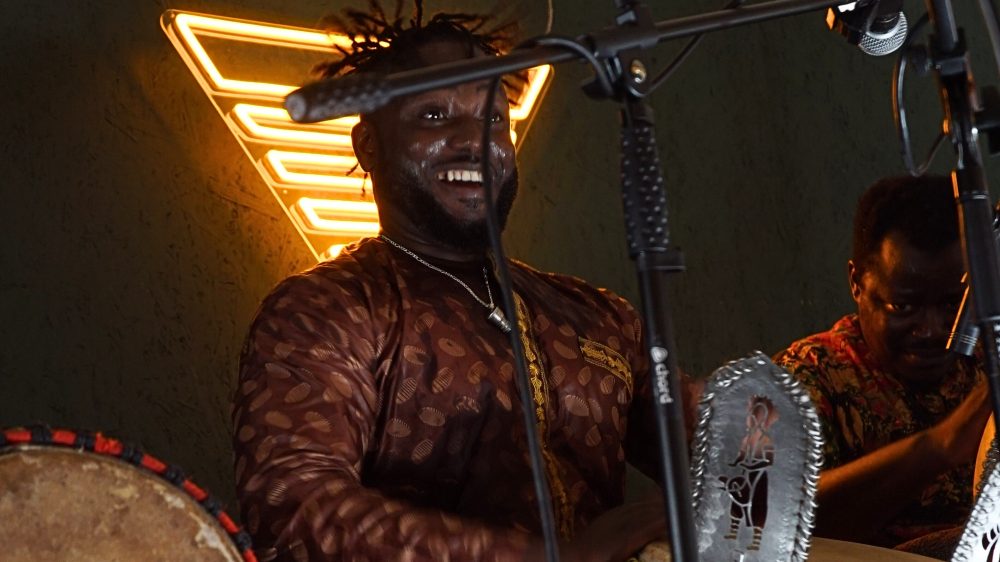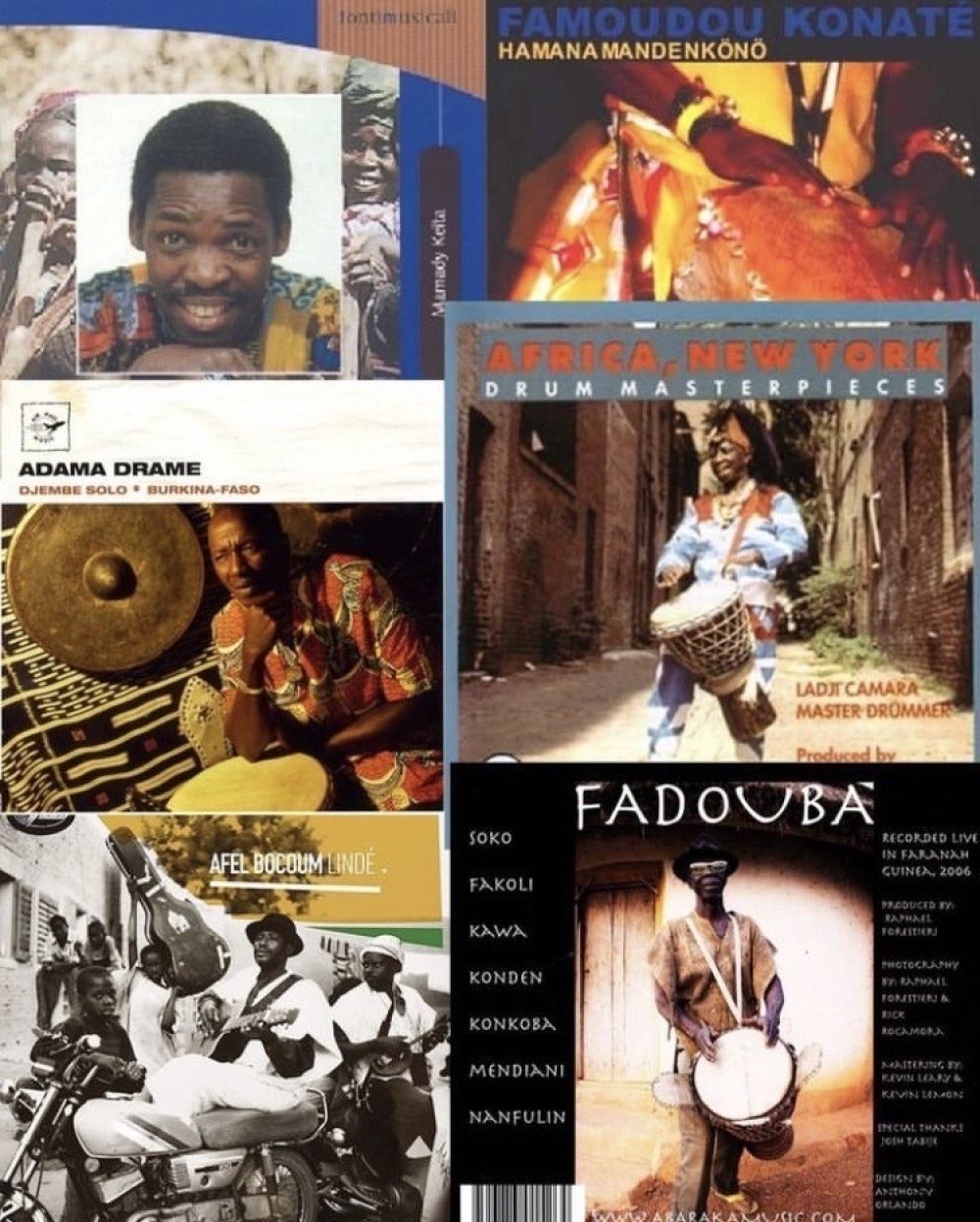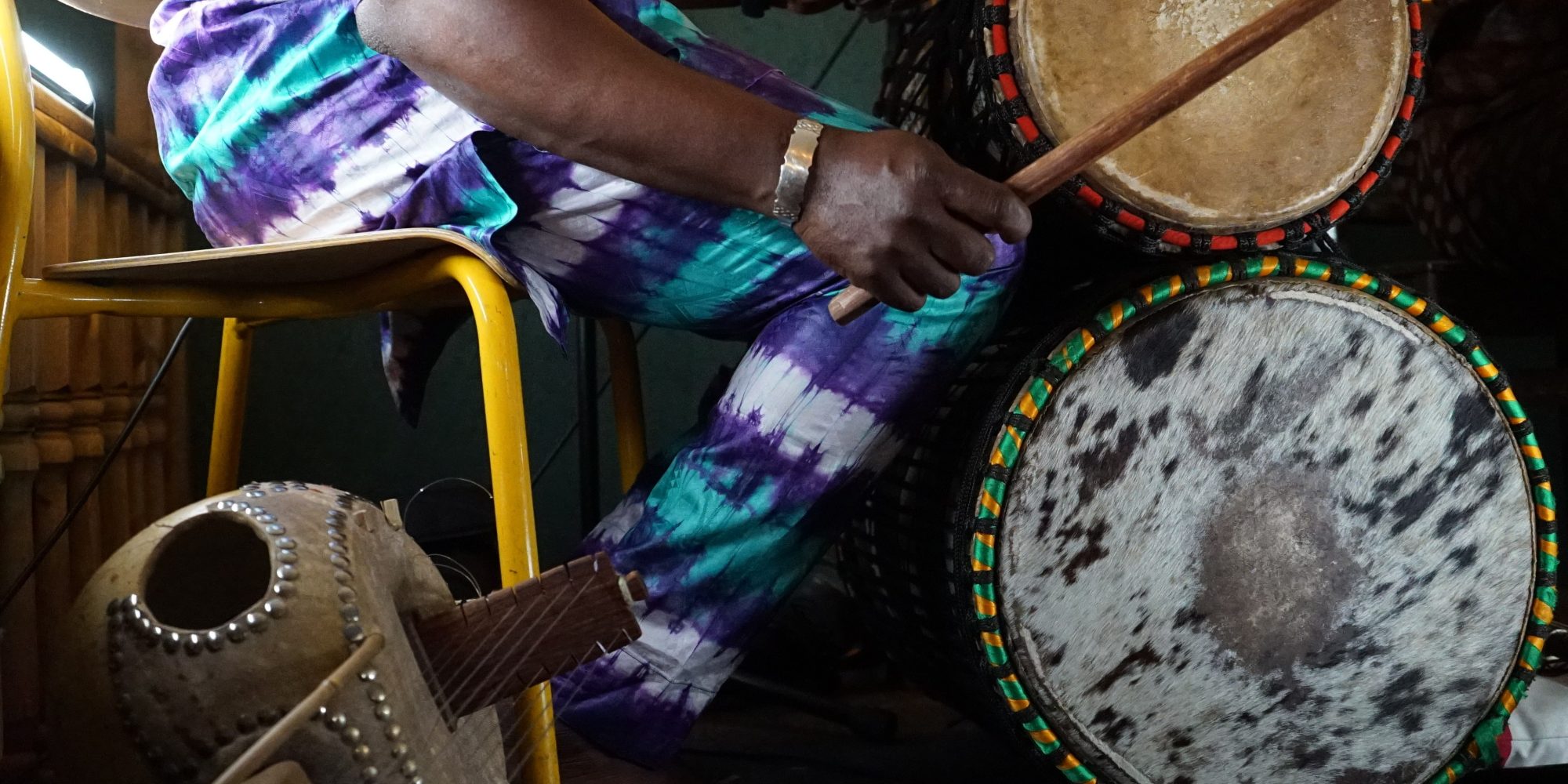At the speakeasy in Dalston, London, Hannah Allchurch had the pleasure of interviewing and listening to the talented multi-instrumentalist Sidiki Dembélé, accompanied by Aboubakar Konate and Momo Sangaré. It was an inspiring and thought-provoking conversation, followed by a beautiful, spiritual performance created by all the musicians on stage. Here’s their conversation.
Sidike Dembélé: I am from the Ivory Coast in West Africa, and my parents come from Mali and the Ivory Coast. I am from a musical family of griots in West Africa. We had an empire called Manding in Mali, Burkina Faso, Gambia, and a few other countries. I inherited griotism from my forefathers and music is part of our nature and our family, so I am a musician and a multi-instrumentalist. My music took me to the UK in 2008, I was touring with a group and I carried on with my tour. Then later on life changed and this destiny decided for me to be part of the nation in the UK and the griot of the UK population.
Hannah Allchurch: It's lovely to meet you Sidike and I hope the UK has been treating you well and you are learning a lot. I know that the djembe is your main instrument, can you tell us a little bit about this instrument, your relationship to the instrument, and any others you play?
My first instrument is the Djembe. Djembe is an instrument that brings people together. United and living in peace is the meaning of “djembe.” It teaches us tolerance, respect, love, forgiveness and living in the community. That's my first instrument. And I also play jeli ngoni, a little instrument [lute] with four strings…. I also play the kamelengoni [harp], and percussion instruments, cabasa and talking drum.
What a beautiful array of instruments. And spiritually and physically how do you feel when you play the instruments?
All of these instruments are spiritual, the djembe particularly has four spirits to go with it, the spirit of the tree, the spirit of the person who carved it, the animal skin and the spirit of the person who plays it. I believe that whenever you play djembe and you have a wish to make, the spirit of djembe will take your wish to the sky and grant your wish.

I can't wait to be thinking of my wish today as I listen to you play. I know you call yourself not just a musician but a storyteller. Can you tell us about the messages that you spread when playing?
In the griot family from the age of seven, you start learning the story and the history of your culture and the people of Manding culture. As a griot, you need to learn all of this and know all of your ancestor's names and what they did. I can talk to them, tell people where they came from, and know who they are to inspire them and to motivate them to be like their ancestors.
Did you always feel this calling to play the djembe?
I was five when I started to play this percussion. Music is in my blood. The Manding word for griot, jali, means blood. You cannot become a griot; you are born a griot. I was called into it. Whatever I did in the past, music wouldn't let me go and it would never let me go.
Who has been your biggest musical influence?
There are so many I cannot pinpoint one person. If I just say one person I am not being honest enough. In my musical journey, I have learned music from so many people, in my culture whoever inspires you automatically becomes your teacher. I have so many people that I listen to and admire but pointing to one person would not be a good idea for me.
Ah ha, yes. That is a sincere answer. And I guess your whole family will always be a huge influence.
Yes, family is number one, because they give me this inspiration.
What is the hardest part of playing and building these instruments?
The hardest part is both. You spend years learning and you never stop learning, no matter what level, you carry on learning. Also, djembe is an instrument that, before you play, you need to learn how to build it. You need to know how to skin your djembe, to change the skin, to tighten the rings, all that. But saying which one is the most difficult? I can't say because the learning part is a learning part that is a journey that never stops. For you, which is the hardest part?
For me? Well, I haven't built it yet?
Ah ha. When you go to school you learn first and then you practice, right? You learn to know the instrument and how to build the instrument before you start playing the instrument. Then I leave that question to you and the audience who are going to read this will sit with it as well.
OK, we will all have something to think about after this interview. In terms of carrying this sound and the stories to different countries and different contexts, has that ever been challenging for you?
Life is challenging in itself, wherever you go you have to adapt yourself to the different cultures, and different people. It is a way of life. You have to be open to embracing whatever you see but not to get involved in things that are not your energy. Whatever is positive, you see it and you know that it can help you in your life.
This is true and some very important advice. Sidike, there is a clear emphasis in your work on cultivating harmony from people of different backgrounds, from your education and teaching. Could you tell us about where this comes from and its relevance to you?
It comes from Africa, because where I grew up, my teachers, mentors and family always showed me this way. This is an instrument that has no borders. It doesn't know color. Whoever plays, the energy the person shows returns to them. Listen more than you speak, always. That is something that got passed on to me since I was young. Still, I am working on this and trying to do it a lot more. Any sort of music I see in my life, I just try and learn it share my energy, and put that all together to grow.
Hmmm yeah, you listen more…
Yes, it is not by mistake that we have two ears and one mouth.
Could you recommend to our listeners five records or artists that feature the Djembe?
All of these are amazing and the top djembe players for me. Mamady Keita, Famoudou Kinate, Harouna Dembele, Babara Bangoura, Madou Konate and Adama Dramé.

What is your favorite genre of music from Ivory Coast?
It is Manding music and that is the music you are about to hear today. That is where I start everything. Manding music influences many different types of music we hear around the world. When I hear Irish music I hear Manding; when I hear blues, I hear Manding; when I hear Ethiopian, I hear Manding. So it is music that has opened many doors for people and for others.
I will probably hear it more now in other genres after today. Home is where the music is at.
That's right, that's right. It's a connection. Once you feel connected to the music, to your instrument, you hear everything, and that will take you through everything. It’s peace. And the same love we are talking about every day, anyone who is connected to their music will understand more about love than anything else, because music itself is true love.
Thank you Sidike, what a beautiful note to end on.









